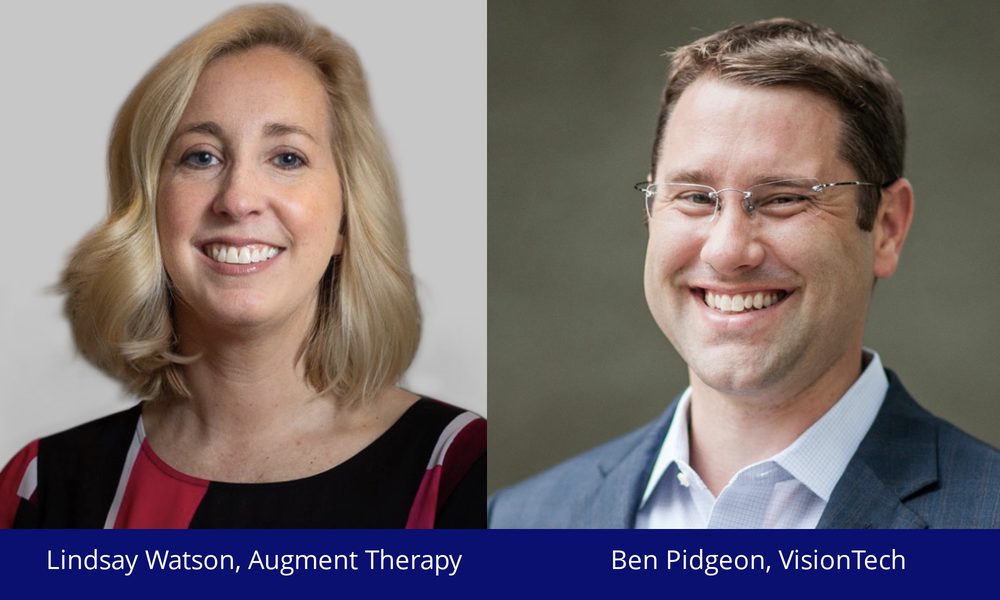If you’re a parent or grandparent, you know how much kids love computer games. When Pittsburgh’s BlueTree Venture Fund suggested VisionTech look at Augment Therapy, a startup that has “gamified” the children’s physical therapy sector, I was immediately interested. How do you gamify something like physical therapy? The company’s CEO, Lindsay Watson, explained that her software platform is designed to engage kids in therapy they often don’t want to do in a way that’s fun. Even kids with the most challenging medical conditions enjoy it. The VisionTech Screening Committee and I were impressed, so we invited Lindsay to present during April Pitch Week. Here’s a sneak preview. I hope you’ll join us for our virtual pitch events on Tuesday, April 27 at 6 p.m. and Thursday, April 29 at 6 p.m. Registration information is at the end of this post.

BP: Tell me a little about yourself and how you went from physical therapist to entrepreneur.
LW: Early in my life, I knew I wanted to go into medicine. I chose physical therapy because I thought it would allow more balance for a career and family. I was obsessed with helping kids so for the next 17 years, I was a pediatric physical therapist working in hospitals, clinics and schools. About five years ago, I realized there had to be a better way to provide services. With adults, you can hand them a piece of paper with ten exercises they need to do and they’ll do it (most of the time). Kids are very different. They are motivated by technology. I became fixated on how I could use digital tools to entice them to do their physical therapy. For example, what if I could use Pokémon Go, an augmented reality game, to get them to walk. Ultimately, I came up with a software platform that combined augmented reality, telemedicine, and remote patient care with gamification and launched my company, Augment Therapy, four years ago.
BP: What inspired you to found Augment Therapy?
LW: The traditional way of delivering physical therapy to kids creates pretty profound pain points. Let me give you an example. A child with Down’s syndrome develops their gross motor skills development much more slowly. Pediatricians order physical therapy starting around age two. This requires parents to bring their child to a clinic every week for years. This is incredibly hard for families. They expend all of their energy getting their child to therapy, working on it at home, and coming back for the next round. Seeing this repeated with each family, I felt it was so wrong.
The other side of the coin is the pain kids feel. They can be scared of their therapist, scared that the exercises will hurt, or in the case of Down’s syndrome kids, be stubborn and just not participate. There had to be a better way.
BP: How did you know you were on the right track?
LW: I don’t often share this story but I was about a year into the company when my four-year-old daughter developed septic arthritis and had to have emergency surgery on her hip. We were in the hospital with her for a week. She had to have intense physical therapy. It was so painful she’d scream when the therapist came into her room. My software was still rudimentary but when we got home, my daughter became my first test patient. She loved it! She wasn’t afraid because it was like playing. That was when Augment Therapy went from obsession to my life’s purpose. I realized I’d been doing physical therapy wrong for 20 years.
BP: Fast forward a couple of years. What does Augment Therapy look like today?
LW: First, the company has really benefitted from participating in a number of accelerators, including the Plug and Play Accelerator in Cleveland, KidsX (the first pediatric-focused digital health accelerator in the world) and the MassChallenge HealthTech. The exposure to mentors, other startups, and investors has been fantastic and helped fine-tune our offering.
Today, Augment Therapy is truly an all-in-one solution to engage, motivate, and monitor kids needing therapeutic exercise. It’s designed for therapists to use in-clinic, via telehealth, or as a new tool for home exercise program monitoring. We’ve built and continue to build a library of evidence-based exercises and interactive games using augmented reality. Another valuable feature is data collection; behind the scenes we capture step counts, repetitions, hand movements, duration, and other metrics are collected with no wearable sensors required. We also provide usage logs, including session start and end time plus time on task to support billing and reimbursement—and that’s a big one particularly for telemedicine. Augment Therapy is also HIPAA and COPPA compliant.

BP: What’s your revenue model?
LW: Monthly subscriptions that includes unlimited patients and sessions and for use in-clinic, telehealth, and home exercise program prescription and monitoring. We currently charge hospital enterprise customers $60,000 per year for two departments with up to 25 providers; private practice outpatient clinics pay $350/month for up to five providers; and individual therapists pay $50 a month.
BP: Has COVID impacted your business?
LW: I hate to say it, but when the pandemic hit—BOOM! In a matter of weeks, all of the barriers we had were wiped away. Clinics and therapists needed a new way to deliver services that was socially distance, reimbursable and effective. We checked all boxes. It was great knowing our product kept kids on track with their therapy.
BP: How big is the market?
LW: In 2018, the U.S. outpatient physical, occupational, and speech therapy centers sector was estimated at $34.5 billion. The pediatric therapy sector is much smaller, and represents 8% of that or roughly $2.8 billion. Despite this smaller size, there are many reasons why this market is an attractive entry point. First, this niche has a profound unmet need and true pain point for parents and kids who typically receive therapy care for years on end versus the average adult who is in therapy for three to six months. The pediatric market has few solutions directed at solving their problems despite the fact that they are some of its long-term consumers. Our niche offering makes Augment Therapy an attractive acquisition for a larger company focused on the adult sector.
BP: Who are your competitors?
LW: Although we do have competitors, there is no one doing the exact same thing in our space. Most are focused on the adult market. Some offer telemedicine only, others engagement options. We are the only company that is engagement, telemedicine, augmented reality, and gamification for all settings, inpatient, outpatient and home.
BP: What kind of traction are you seeing?
LW: We have a lot on our plate! We have a pilot program with University Hospitals’ Rainbow Babies & Children’s Hospital in Cleveland and are signing a three-year contract. We are finalizing two deals with educational services companies in Ohio that provide physical therapy services in schools. We are also scoping five pilots, three in the U.S. and two overseas, with hospitals through the KidsX Accelerator and two more through Mass Challenge Health Tec in a Midwest hospital system that spans two states. We’ll also be announcing a major collaboration on April 22 that I’m really excited about.
BP: What will this investment round be used for?
LW: We’re raising $1.25 million and of this, we’ve already closed on $902,500. The funds will be used to add to our team to help execute our pilot programs. This includes hiring another developer and operations team members.
BP: Why should VisionTech investors back you?
LW: The main reason is that we’re going to change a lot of lives for the better. From a business perspective, we are strategically well positioned for the seismic shift in healthcare due to COVID-19 that accelerated, literally overnight, adoption of telemedicine and digital health solutions. Because of our pilot programs and collaboration opportunities, our valuation is going to go up quickly. There is a lot of interest in who’s going to close the round and we’re really looking for investors who bring more to the table than checks.
To learn more about Augment Therapy, visit their website. VisionTech Angels’ April Pitch Events will be virtual on Tuesday, April 27 and Thursday, April 29 at 6 p.m. Pitch events are open to our members and accredited investors interested in joining our group. To register, check your email for an invitation, go to our Events page or email Ben Pidgeon at bpidgeon@visiontech-partners.com.

